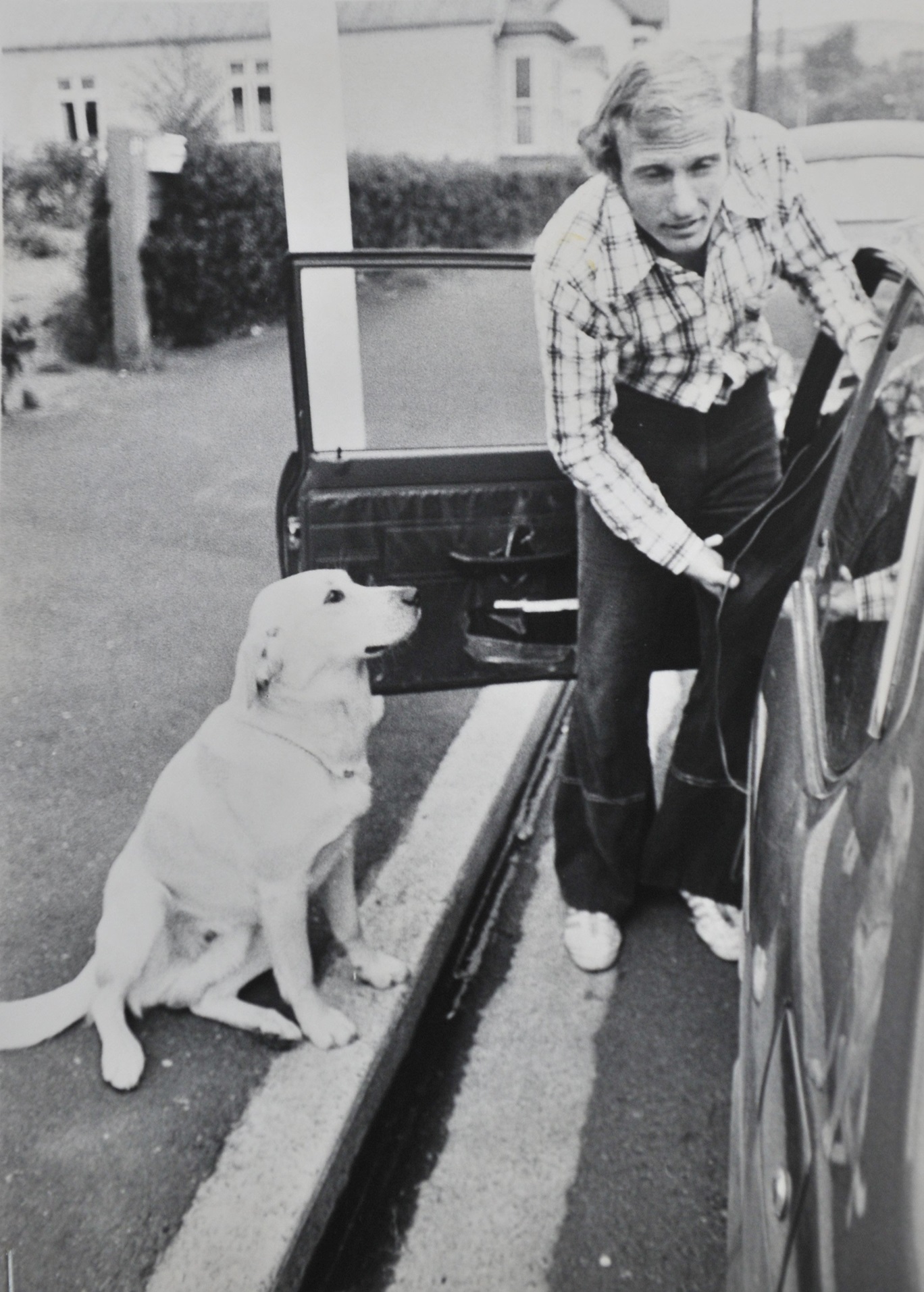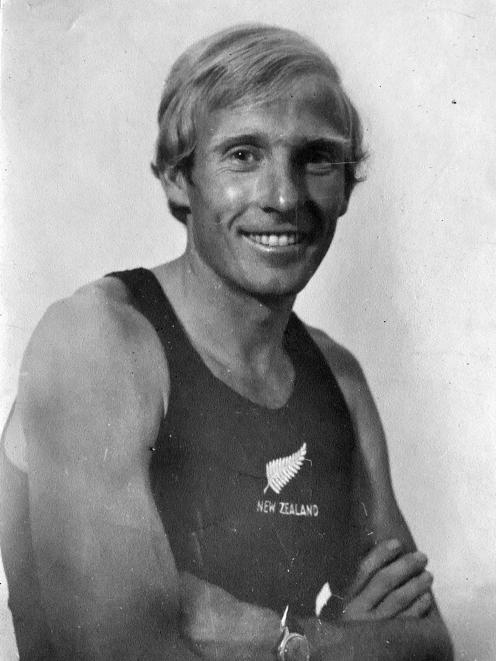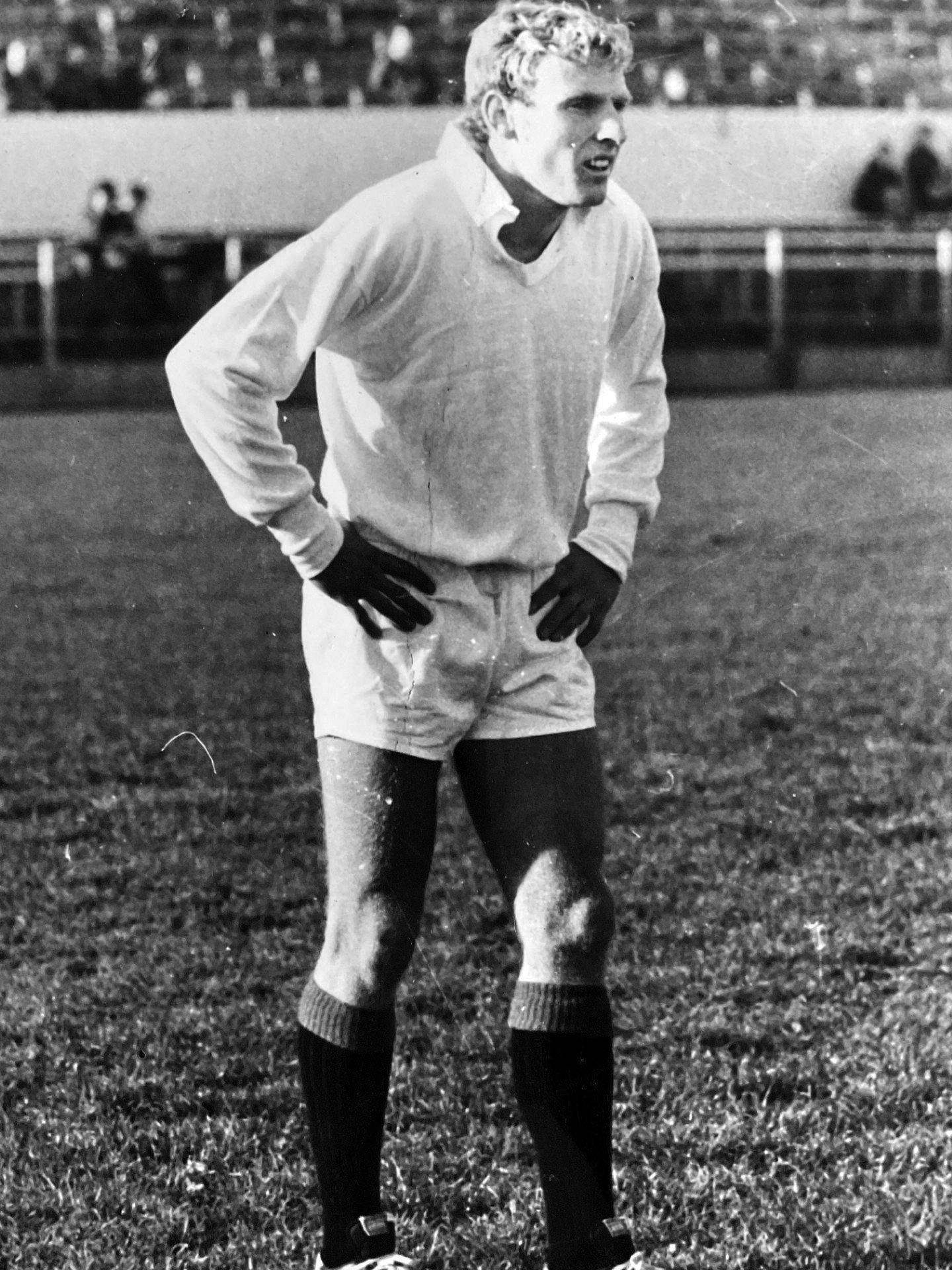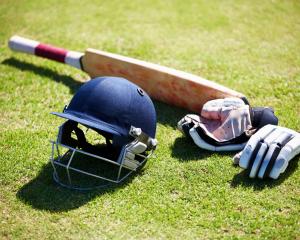
Bruce Hunter played 10 games, including three tests, for the All Blacks. He also won three New Zealand 800m titles, and was part of a 4x800m relay team that set a record in 1971 that still stands.
Oamaru-born Hunter, a proud old boy of Waitaki Boys’ High School, was last month inducted into the Waitaki Sports Hall of Fame. Hayden Meikle tracks him down for a yarn.

We’re in West Melton, just 13km out of Christchurch. Our daughter’s next door and we’ve been here about eight years. We moved from town to be close to our daughter, and it works very well. They’re all footy players. Must not say soccer. We’ve got two daughters and a son, and eight grandkids in all.
You were a teacher, were you not?
Yes, I was at Shirley Boys’ for over 30 years. I suppose I should have moved on, but you know, you become ingrained in one school and enjoy it and the atmosphere in it. Shirley was just a great wee school and I stayed there for many years. Probably a bit too long, as I say, but I got out just after the earthquake and came back as a relief teacher. I would probably be in demand today by the look of things.
What did you teach?
Phys ed. I trained here in Christchurch. I actually taught at Christchurch Boys’ unqualified. I think they got into a bit of trouble hiring me. But they said, well, you might be reasonable at the job, so maybe you should go and get some proper training, which I did.
How did it feel to be inducted into the Waitaki Sports Hall of Fame?
Honoured. Yeah, greatly honoured. In my day, sport was very important in the town. Rugby and hockey and soccer were very strong. And the local track and field club was extremely strong. The people that went through there — Jack Sutherland, Sandra Goodsir ... it was the sort of place you could go down every afternoon and there’d be someone there to coach you. Me and my mates just toddled on down there and we did all the track and field events. It was a privilege, really.
What did your parents do?
My father worked on the hydro dams at one stage and was a secretary on the local wharf until the big strike. He lost his job and ended up in the local woollen mills, which really killed him, I think. The old carding machines. It was pretty tough going. I’m one of eight children. Oamaru was a great place to be brought up, that’s for sure.
And you went to a high school that is very close to my heart. What are your memories of your years at Waitaki Boys’?
Oh, I absolutely loved it. Scholar-wise, I didn’t perhaps achieve what I should have achieved at high school, but the sporting opportunities were amazing. It seemed to be a huge thing to make the First XV. The caps and hakas and the traditional matches with St Kevin’s College — it was amazing. We were unbeaten in my last year. When you look at the team, it was pretty strong. There was Greg McGee in the Junior All Blacks, Archie Hurst in the All Blacks and a number of other players that played senior rugby in the future. We knew when we passed the ball what we were doing and where we were going. We were always down there kicking balls over the posts. I think the time we put in seemed to pay dividends on the field. And Malcolm Kissel, the First XV coach, was just a legend, really. I’ve still got my red Waitaki blazer, but I have not got my cap. And I’ve looked hard for it.

To be honest, I don’t know that I’d be suited to today’s game. But I just seemed to be able to produce the same speed on the track as I would on the rugby field. And not all sprinters had that ability to transfer. And it kept you out of trouble, basically. I always thought that the sevens rugby might have suited me today.
After making your Otago debut at 18, you got selected for the All Blacks’ tour of South Africa in 1970. And you became the answer to a quiz question when you started two games for the All Blacks on the same day when you had a stop-off in Perth. What do you remember of that day?
Unfortunately, perhaps not the best of advice. They asked me to play the two games. I was keen as mustard, and being as fit as a buckrat, I said, ‘yeah, that’s fine’. But I just slowed up in the last 15 minutes and got crashed a couple of times and weakened the hamstring, which was the problem right through that African tour. I wouldn’t say treatment in those days was the very best.
What are your memories of the 1970 tour?
Just a great honour to be selected. In those days, it sort of ended around the final trial, which was in Wellington. And I happened to have a good game, and you’re just under the stand, basically, and they’re announcing the team. I was blown away. I’d have loved to have been fully fit. It was an incredible tour. They had an extremely strong team over there. And very, very hard players to play against. But I didn’t achieve what I wanted to achieve there, unfortunately.
You played three of the four tests against the great 1971 Lions team. What do you remember of that?
I look at the players and they just didn’t have any weak spots. JPR Williams at fullback, David Duckham and Gerald Davies on the wings, Barry John, Mike Gibson, Willie John McBride, Mighty Mouse McLauchlan — you tell me where there’s a weakness. And extremely well coached. But it was quite a close series. The first test in Dunedin was very close, 9-3. And unfortunately, in the first quarter, the touch judge said I just sprigged the paint just the slightest. And I could have scored and changed the game. We beat them well in Christchurch. And then Wellington, they won. And then the 14-14 draw in Auckland. I got concussed and I was stood down for the final test. There wasn’t that much in it, but they were a very good team.

I guess it’s a bit different these days with professional contracts. You would play longer and maybe travel to Japan and Europe when you were sort of done with your All Black days. The opportunities weren’t there then and I felt as though I’d achieved as much as I could have. And I simply went to running. Track and field was very strong in my mind. And I had a great urge to qualify for the Olympics. I had the opportunity to try for Munich. And so I put rugby aside at that stage.
Why did you not quite make the plane for the 1972 Munich Olympics?
They had a qualifying time in those days, which was very strict. I think it was 1min 47.6sec for 800m. I went to the Olympic trials in Auckland, defeated John Walker, and ran 1min 47.7sec. I went back back to Dunedin and did 1min 47.8sec. So Arthur Lydiard came down to Dunedin and he was talking to Dick Tayler as well. And he suggested that I go to Denmark, where he was the resident coach of the Olympic team. And he set me up with a professor in English at a Danish university. I stayed at his house and attempted to achieve the time in Europe. Unfortunately, I trained with Dick and others and actually put in too much mileage. I went from 70 miles a week, which was my traditional offseason, to 130 miles a week. And it flattened me. I mean, Dick could handle it. But I couldn’t. So I got to Europe extremely flat, and the best I could produce in the British champs was about 1min 49sec. So that was a mistake. I had until August, I think, to qualify. But I never achieved that milestone, unfortunately
Did that linger for a while, the disappointment of not making it to the Olympics?
Yeah, absolutely. And I think I had a season back at rugby. But I kept running right through to veteran years and quit shortly after.
In 1971, you joined Dick Tayler, Stuart Melville and Stephen Lunn to set a New Zealand 4x800m relay record of 7min 27.2 sec at the old Caledonian. Can you believe that record still stands?
When you look at it, that’s a pretty smart team. Even Dick could still run a very smart 800m. Incredible, yes. And I was just lucky enough. I think I might have run the last leg in about 1min 50sec flat, which wasn’t bad. It was a real highlight.

I did, yeah. The challenge was a marathon, really, after being a speed runner. And funnily enough, the first one was the fastest one. I think I did a 2hr 28min. It was quite a highlight just to achieve that. Injuries were a problem once I hit 40. But I managed to ... I think it still stands. The 800m veteran record, I think, is still there. I can’t believe it’s still there, given the runners that are around and that retired.
Modern rugby is a very different beast. Do you watch rugby these days?
Yes, I do. It’s a different ball game, absolutely. The forwards are basically all ball-handlers. They can run like backs. But it seems to be a bit similar to league in that there’s a lot of forwards out in the backs. There’s a lot of crashing that goes on into carrying the ball up. It’s not quite the same concept of the ruck and quick ball out to the wings and one-on-one. But, yeah, I still enjoy top-level rugby.
You’re not a Crusaders fan, are you?
Oh, I’m torn between the Crusaders and the Highlanders. I’ve probably been up here longer. But I have a very soft spot for the Highlanders.
Who was the first person to call you Blondie?
I think it came from my long curls, as a baby. And I think it was probably my family or my friends, because my friends refer to me as Blondie. I’ve got a very good friend in Wellington who still rings up or sends me an email as, how are you Blondie? It follows me everywhere.












